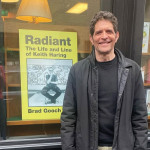I received my HIV diagnosis in June 1984—39 years ago. I had just started graduate school at the University of South Florida’s Tampa campus. When I went for my results, I was ushered into a room with more than 25 medical professionals. I turned to the nurse and said, “I guess I have it; otherwise, these people wouldn’t be here.”
The doctor told me he wasn’t sure how long I had to live but that it was probably less than three years. I was gobsmacked. I walked across campus, went to the registrar’s office and immediately dropped out of school. Then, I drove into St. Petersburg and quit my job as a buyer for a major department store.
Now what? My life spiraled downward. I was out of control and so was my drinking. But slowly, I realized that my life wasn’t ending as quickly as I’d imagined. I did some soul searching and discovered that education was my calling. I became an English and history teacher.
This was before we had effective HIV medications. I started to lose weight. I stopped drinking, which significantly helped me along my journey. As various HIV drugs became available, it seemed I took all of them. I took AZT, but it was short-lived. I told my doctor that I would wait for something else. I had the worst time with liquid Norvir. It tasted like gasoline. Yet I persevered, and I began gaining weight.
Dealing with these health issues helped me find my voice as an advocate and activist. I got involved with ACT UP and worked as a case manager. I was a buddy to a few others who were living with HIV. I took them to appointments, did their shopping and basically let them know they mattered.
I also protested on many occasions. I was in the middle of a die-in at the rotunda at the Capitol. I was part of the ACT UP protest at the Food and Drug Administration. I participated despite knowing that I could be fired. It was illegal to be a teacher in the Pinellas County Schools system if you were gay or HIV positive. These actions guided me along my path of activism.
In 2014, I moved from the beaches of St. Petersburg to the mountains of Tennessee. I had fallen in love with a man named Butch Ferney, and the long-distance relationship thing wasn’t going to cut it. Unfortunately, in 2015, he passed away. He left behind a legacy of HIV activism in Tennessee, a son and three granddaughters. I continue my HIV activism for him, his family—and for myself.
Things are very tough in Tennessee as far as HIV prevention is concerned. I still actively advocate for PLWHIV [people living with HIV]. As Elaine Stritch sang in Follies, “I’m still here!” I will continue the journey of HIV advocacy and activism until I can no longer.
What three adjectives describe you?
Authentic, caring, resilient.
What keeps you up at night?
The current state of affairs in Tennessee.
What is the best advice you’ve received?
Be true to yourself, no matter what.
What person in the HIV community do you most admire?
Shanell McGoy, PhD (the director of HIV/STD for the Tennessee Department of Health).
What is your motto?
Watch out! I have just begun to blossom.
Read other POZ Stories or share your own at poz.com/stories.







Comments
Comments